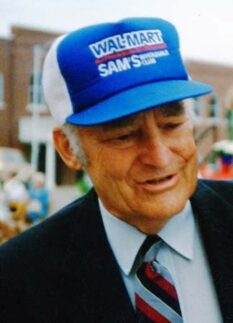Samuel Moore Walton, born on March 29, 1918, in Kingfisher, Oklahoma, was an American business magnate known for founding Walmart and Sam’s Club. He grew up in a farming family but moved frequently due to his father’s job as a farm appraiser and mortgage agent. During the Great Depression, his family faced financial struggles, leading Walton to take on various odd jobs to support them.
Despite the challenges, Walton excelled academically and became the youngest Eagle Scout in Missouri’s history while attending eighth grade in Shelbina, Missouri. He continued his education at the University of Missouri, where he joined the ROTC and various campus organizations, graduating with a bachelor’s degree in economics in 1940.
After college, Walton joined J.C. Penney as a management trainee but left in 1942 to serve in World War II. He eventually reached the rank of captain in the U.S. Army Intelligence Corps, supervising security at aircraft plants. Following his military service, Walton took over the management of his first variety store in Newport, Arkansas, with financial assistance from his father-in-law. This marked the beginning of his entrepreneurial journey.
With the success of his first store, Walton continued to open more Ben Franklin franchises, pioneering concepts such as offering competitive prices and ensuring well-stocked shelves. In 1950, he opened a store in Bentonville, Arkansas, which laid the foundation for the first Walmart store in 1962.
The first Walmart, located in Rogers, Arkansas, aimed to provide one-stop shopping for customers with a focus on American-made products. Walton’s strategy of locating stores in smaller towns and emphasizing logistics and efficient delivery contributed to the chain’s rapid expansion and success. By 1985, Walmart had grown from 190 stores to 800.
Throughout his career, Walton remained dedicated to his family and community. He married Helen Robson in 1943, and they had four children. Walton and his family were active in their local church and supported various charitable causes. He also integrated the concept of “service leadership” into Walmart’s corporate structure, emphasizing the importance of serving others.
Despite his business success, Walton faced health challenges, including a diagnosis of Hairy cell leukemia. He passed away on April 5, 1992, at the age of 74, leaving behind a lasting legacy as one of the most influential figures in retail history.





